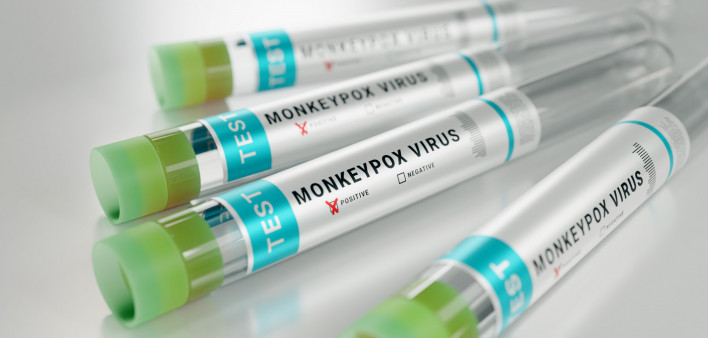Four months ago, most of us had not heard of monkeypox (MPX). Now we must roll out another vaccine for a different virus that is mostly impacting gay and bisexual men. We have the impossible task of asking people to get an additional shot after asking them to get up to four COVID vaccines. What is the plan to make the impossible possible?
Last week I asked the Centers for Disease Control to recommend that all sexually active gay men get the MPX vaccine. The request went to the White House, HHS, CDC, NIH, and HRSA. The latest CDC data shows people of color bear the brunt of MPX cases. Latinx make up 31% of all MPX cases, and African Americans make up 27% of the cases.
There are not enough cases to know if this trend will continue, but the data sounds all too familiar. As of July 29, there are 5,189 MPX cases. While not yet an epidemic, the window is closing for vaccines to stop the virus. Given the data on who gets MPX, vaccine equity must be prioritized.
David Munar from Howard Brown Health in Chicago shared a frontline perspective of MPX, and I’m scared:
I hope you are well. Our walk-in sexual health clinics are seeing a very high volume of MPV [monkeypox virus] cases, many with very severe disease. Our clinic staff are stressed and increasingly scared of infection. Though we maintain high PPE standards, zero contact with patients’ skin or the objects with which they have touch is nearly impossible. We have patients seeking STI care who late in their visit disclosure lesions or unusual rashes. Many patients present with lesions on their hands. We understand that health care workers generally have a low risk of occupational exposure because of the way MPV is transmitted. Notwithstanding, we believe our situation is unique because of the sheer volume of cases we are seeing and the advance disease of many patients. Most patients delay MPV clinical evaluations until the pain and discomfort is unbearable, which likely also correlates with severe infectiousness. We are urging our local health department to permit vaccinations for our sexual health care teams because the conditions in our clinic are endemic. Because of the vaccine shortage, however, they continue to refer to CDC guidance that is heavy on PPE and light on the level of risk. In a general healthcare setting, this may be true. But even if the risk remains low despite high volume and high severity, the perception of an unsafe work setting is hampering staffing levels. We lost one provider who stepped away from stress and fear today and another (pregnant) who is about to.
I suspect the situation at your clinics is similar. Please advise. Have you had any luck convincing authorities to allow vaccinations (even limited) to healthcare workers of MPV patients or with high volumes of MPV cases? For our cis-female workforce it is especially hard to see MSM present for vaccinations with questionable risk levels when they are continuously in close contact with the virus. Your thoughts and/or advocacy leads would be appreciated.
Thankfully, David was able to talk with the Centers for Disease Control (CDC) to directly share his concerns. His agency just got permission to vaccinate 25 staff, but that is a drop in the bucket. They need to vaccinate 115. Who gets the vaccine first? Not only is Howard Brown working to end one epidemic, but they are also fighting to stop another virus from becoming another epidemic. This is in the middle of COVID, recession, fall elections, Black Lives Matter, and the list goes on. This is not normal.
We are very pleased that, just today, August 2, President Biden has appointed Dr. Demetre Daskalakis, CDC’s HIV prevention chief, as deputy coordinator for the MPX response.
With his experience, Demetre is an excellent choice for this task, and we look forward to working with him on MPX. CAPT Robyn Neblett Fanfair, M.D., M.P.H., will serve as Acting Director for the CDC’s Division of HIV Prevention.
But that’s just a first step. Here are the issues to be prioritized in the federal response:
- More Vaccine
- Change the Racist, Stigmatizing Name
- Vaccine Equity and Overcoming Vaccine Hesitancy
- What is Safer Sex in a World with MPX?
- Community Education
- Worried About the Right
More Vaccine
It is unacceptable to wait months for vaccine, especially when Canada has enough to give it for free to tourists. Last week the administration cleared 800,000 doses that were waiting for FDA sign-off. While the community appreciates those vaccines, the reality is that the Jynneos vaccine requires two shots, so this release only helps 400,000 people. That is not enough for New York City, let alone the entire country.
This all sounds too familiar. I remember ACT UP’s “Seize Control of the FDA” in 1988 with friends shouting, “hey, hey, FDA, how many people have you killed today?” ACT UP got the FDA to change the drug approval process. Once again, there are concerns about the speed of the FDA approval process of the MPX vaccine manufacturer in Denmark. On a recent White House call about MPX, the leadership seemed out of touch. The call did not mention Gay men or the disproportionate impact that MPX has on Gay men of Color. They discussed towels and sheets as potential vectors but did not mention oral or anal sex. I fear that homophobia has slowed the response to MPX. I’ve been told it will be months before there is enough vaccine.
Change the Racist Stigmatizing Monkeypox Name
Words matter. For too long people of color have been labeled with racist dog whistles, especially when they compare us to animals. NMAC joins the World Health Organization in calling for a name change. The term “monkeypox” stigmatizes people of color and harms LGBTQ communities. The name was created in 1958 when there were different sensibilities. The stigma of this name creates even more vaccine hesitancy. It’s time to either rename the virus or just call it by its abbreviation: MPX.
Vaccine Equity & Overcoming Vaccine Hesitancy
People of color, particularly Black and Latinx gay men, are 64% of people with MPX. Federal plans need to do more than just distribute vaccine to states. As we’ve learned from PrEP and COVID, without a commitment to equity, many critical communities will be missed. Federal vaccine distribution must require states to address vaccine equity and overcome vaccine hesitancy, particularly for Black and Latinx gay men.
Overcoming vaccine hesitancy is directly linked to our efforts for vaccine equity. Many people of color do not trust the system. Anecdotally, I’ve heard that too many gay men of color are hesitant to get the MPX vaccine. The Biden administration is committed to equity, so let’s make sure it is part of this work. For NMAC, equity means building a healthcare infrastructure in the communities that are highly impacted by MPX, STDs, Hepatitis, and HIV.
What Is Safer Sex in a World with MPX?
It may be months until there is enough vaccine. What do we tell sexually active adults about how to protect themselves from MPX? WHO says we should press pause. As we’ve seen with HIV education, I’m not sure that will work. Pause, like abstinence, sounds good in theory, but fails in practice. We deserve real answers, and right now it’s not clear. The San Francisco AIDS Foundation just posted a guide for attending Up Your Alley (aka Dore Alley) without fear of monkeypox. HIV education needs to expand to include information about MPX and how to prevention it.
It’s not just about gay men. What about the transgender community? What about sex workers? What about sexually active adults? The lack of information is scary, but we have history to fall back on. The early days of AIDS taught us how to adapt and educate during very confusing times. Until there is enough vaccine, the CDC needs to provide guidance on safer sex in a world with MPX.
Community Education
Right now, monkeypox sits at the intersection of Gay Men, new sexually transmitted diseases (STDs), a world that is tired of fighting viruses, and shortages of vaccine. How can we convince our communities to get another shot? It’s not enough to passively offer vaccines. As we’ve learned from PrEP and COVID, we need to create demand in those communities that we’ve missed in the past through campaigns that are run by and centered on the community. Let’s learn from our HIV experiences.
This is going to take money. Last week, the Washington Post said the Biden administration floated a trial balloon of $7 billion to address MPX, and NMAC believes that is a good first step. However, we can’t wait for Congress. Declaring MPX a national health emergency allows HHS to redirect resources to this effort.
Worried About the Right
As we’ve seen with abortion, the Right has an effective Supreme Court strategy. The MPX narrative plays directly into their belief that homosexuals are sick and unworthy. Initially, I thought they would go after gay marriage, but now I’m not sure. There is a court case in Texas that challenges the use of ACA funds for STD and PrEP programs for gay men. While it’s too early to know where this is going, NMAC is closely monitoring the situation with our friends at Lambda Legal.
I’m sharing this information because MPX initiatives in conservative states could be under attack. We must balance the need to educate community with the understanding that our work is under a microscope by forces who hate us. To be honest, they are going to hate whatever we do. There seems to be no middle ground.
It’s time for the White House to include the HIV community in the MPX planning process. The HIV movement spent the last three decades reaching gay and bisexual men with HIV prevention and care messages. However, efforts to vaccinate must be multisectoral and include STDs, Hepatitis, LGBTQ, FQHCs, health departments, and healthcare providers, the exact same communities needed to end the HIV, STD, and Hepatitis epidemics. It’s why we fight for a syndemic solution.
Yours in the Struggle,








1 Comment
1 Comment